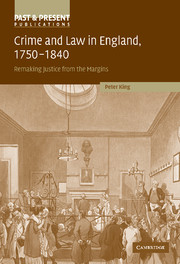Book contents
- Frontmatter
- Contents
- Preface
- List of figures
- List of tables
- 1 Shaping and remaking justice from the margins. The courts, the law and patterns of lawbreaking 1750–1840
- Part I Juveniles
- Part II Gender
- Part III Non-lethal violence
- 7 Punishing assault: the transformation of attitudes in the English courts
- 8 Changing attitudes to violence in the Cornish courts 1730–1830
- Part IV The attack on customary rights
- Index
- Past and Present Publications
8 - Changing attitudes to violence in the Cornish courts 1730–1830
Published online by Cambridge University Press: 25 July 2009
- Frontmatter
- Contents
- Preface
- List of figures
- List of tables
- 1 Shaping and remaking justice from the margins. The courts, the law and patterns of lawbreaking 1750–1840
- Part I Juveniles
- Part II Gender
- Part III Non-lethal violence
- 7 Punishing assault: the transformation of attitudes in the English courts
- 8 Changing attitudes to violence in the Cornish courts 1730–1830
- Part IV The attack on customary rights
- Index
- Past and Present Publications
Summary
While there can be little doubt that attitudes to interpersonal violence were changing in the eighteenth and early nineteenth centuries, it has proved remarkably difficult for historians to analyse precisely when, why and with what consequences those changing attitudes occurred. An extensive debate about murder rates, which are virtually the only quantifiable measure of violence levels (and a very problematic one at that) has arisen, and on the other side of the coin extreme judicial violence in the form of hanging has also recently been subjected to considerable analysis. However, the vastly more frequent number of acts of everyday violence which did not lead to murder and, in the other direction, the very frequent use by the courts of violent punishment not resulting in death, have only just begun to receive attention. Through Landau, Shoemaker and Smith's work on London, and through King and Beattie's work on Essex and Surrey, major changes in attitudes to assault indictments and to the use of public whippings (and whippings in general) have been uncovered but this work has been extremely restricted geographically. The criminalisation of assault and the declining use of public whipping have been effectively documented for the area in and immediately adjacent to London but not for any other region. This paper attempts to broaden that analysis by using the records of a county almost as far away from London as any other part of England and Wales — Cornwall.
- Type
- Chapter
- Information
- Crime and Law in England, 1750–1840Remaking Justice from the Margins, pp. 255 - 278Publisher: Cambridge University PressPrint publication year: 2006



